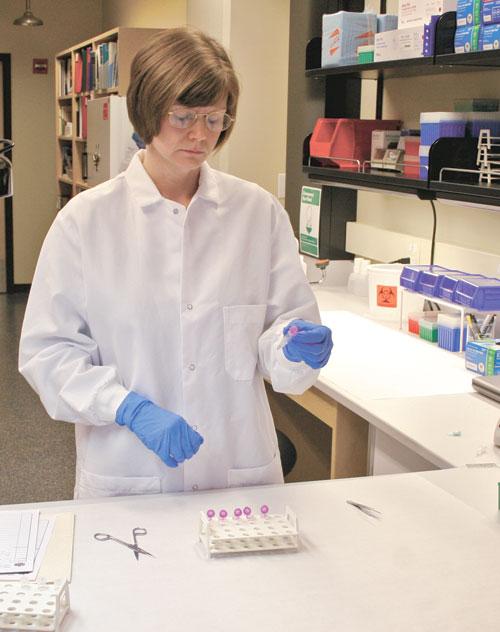But to Mayer, 29, who has worked in the crime lab for five years, variety is a good thing.
"It's something new, something different every day," Mayer said. "It's important to me to do the job and get the results as quickly as I can. I tend to work different types of cases to maximize my efficiency."
With sticky notes plastered across her work desk, Mayer tries to balance 15 unique cases at a time. Some DNA analysts carry more, others less.
"Everybody has their own caseload," Mayer said.
But even with every analyst working 40-hour weeks, the crime lab has amounted a 1,800-case backlog of the past several years of DNA evidence waiting to be examined. Department of Justice officials have attributed the backlog to Wisconsin's increased use of DNA evidence in criminal investigations.
"Personally, I feel more pressure," Mayer said of the backlog. "I sometimes put myself in the victim's place, and I would want my case to be worked as quickly as possible."
Earlier this year, DOJ officials requested $7.7 million in state funds to double the crime lab's number of DNA analysts with the hope that they would eliminate the backlog by 2010 and help the department cope with future demands.
The Wisconsin Legislature and Democratic Gov. Jim Doyle responded March 16 by approving the biannual Budget Repair Bill, which reallocates remaining funds from state departments to close the current budget cycle.
The state granted the DOJ $96,000 to recruit and hire 15 new analysts of its requested 31 positions one month before the next two-year budget cycle, which begins July 1. Legislators and the governor will decide funding to retain the 15 analysts as well as 16 more positions this spring. The DOJ hopes to receive a total of 29 DNA analysts, one supervisor and one technical support position.
Kevin St. John, a DOJ spokesperson, said the department is currently seeking applications for the new positions. According to the DOJ's website, which lists forensic scientist employment opportunities, qualified applicants hold at least a bachelor's degree with a major equivalent to biology, genetics, molecular genetics, biochemistry or microbiology.
Most competitive applicants also have field experience and an advanced degree. St. John said all of the positions were originally proposed for Madison's crime lab, but said the department has lately discussed possibly placing six analysts at the Milwaukee crime lab.
Life as a DNA analyst isn't exactly as most people perceive it to be, Mayer acknowledged. The nation's second-most watched television show, "CSI: Crime Scene Investigation" on CBS, portrays a few inaccuracies about the position.
"The science that they perform, from what I have seen, is very accurate," Mayer said. "The time that they do it in is not. It takes us a much longer amount of time to conduct those analyses."
Unlike the show, Wisconsin's forensic scientists do not interrogate suspects or carry weapons in the field and most of their work is done in the laboratory. And unlike the show's attractive blue-lit set, the Madison crime lab looks like a science classroom with more sticky notes.
However, there are a few eye-catching displays in the lab. One window peers into a room with hundreds of firearms used to identify weaponry or mirror crime scene shootings. Another display showcases a diverse and somewhat humorous collection of drug paraphernalia.
Besides her work desk, Mayer spends time on occasion in the break room for a piece of chocolate or conversation. But like most forensic scientists, she's glad to return to work.
"I think everybody here just knew it was right for them," Mayer said. "It's very rewarding. I feel like I'm using my education, my skills to make a contribution to my community, my state."







